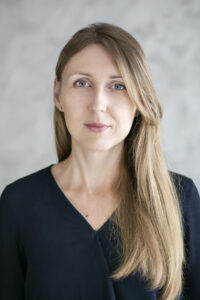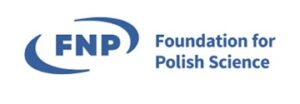Honorata Kraśkiewicz, PhD (Assistant Professor) – Group Leader
Dr Honorata Kraśkiewicz is a solution-driven biotechnologist with profound experience in in vitro cell culture, cell biology and development of medical devices. She has dozen years of post-PhD experience working with cutting edge biological, cell, molecular and biochemical technologies in the field of tissue regeneration (experience in neuro and skin regeneration; stents) gained in international academic and industrial settings.
Dr Kraśkiewicz has graduated from Wroclaw University of Technology, Poland with a Msc. Eng. in Biotechnology (2006). Then she gained considerable experience in cell and molecular biology during her PhD study at National University of Ireland, Galway where she was awarded a doctoral degree in Biomedical Engineering (2011). Before moving back to Poland, she has been working on two postdoctoral projects at Network of Excellence for Functional Biomaterials (NFB), Galway, Ireland, aimed at developing advanced strategies for treating spinal cord injuries using natural biomaterials.
An industrial R&D experience she has gain while working in Balton LTD (2014-2017), a biomedical devices company in Warsaw, where she was working on the development of an innovative biomaterial-based therapy for cardiovascular regeneration under the Marie Curie Industry-Academia Partnerships and Pathways project.
From 2017 dr Kraśkiewicz is working at Hirszfeld Institute of Immunology and Experimental Therapy, Polish Academy of Sciences (IIET PAS) in the Laboratory of Biology of Stem and Neoplastic Cells where between 2017 and 2019 she was a principal investigator of POWROTY/REINTEGRATION project financed by Fundation for Polish Science focusing on the development of next generation wound dressing incorporating stem cell-produced growth factors.
Currently dr Kraśkiewicz is a partner in an international project M-ERA.NET3 Call 2021 Anti-calcification treatment of elastin-rich bioprosthetic materials using Fetuin A for aortic valved conduits (VENUS) and an international project M-ERA.NET3 Call 2023 Electrospun scaffolds with antimicrobial and wound-healing capabilities utilizing bacteriophages, mesenchymal stem cell–derived factors and MXenes. In 2024 she was also awarded by The National Science Centre (NCN) a Sonata Bis 13 project Exploring the Therapeutic Effects of Human Adipose Tissue Mesenchymal Stem Cell (HATMSC) line Secretome on Chronic Skin Conditions.
Research interests
My research lies at the intersection of biology and material science, focusing on the biological evaluation and development of innovative biomaterials for regenerative medicine and therapeutic applications. I am currently engaged in several interdisciplinary projects aimed at addressing critical challenges in wound healing, inflammatory skin disorders, and cardiovascular health. My key area of research involve the development of advanced wound dressings tailored for chronic, non-healing wounds. These dressings incorporate bioactive substances derived from mesenchymal/stromal stem cells (MSCs), which possess regenerative and immunomodulatory properties. My work focuses on the biological evaluation of these substances using in vitro models to optimize their therapeutic potential and accelerate the healing process.
Project group members
- Honorata Kraśkiewicz, eng., PhD – Group Leader, honorata.kraskiewicz@hirszfeld.pl
- Paulina Piotrowska, MSc – PhD student, paulina.piotrowska@hirszfeld.pl
- Aleksandra Zawadzka, eng., MSc -PhD student, aleksandra.zawadzka@hirszfeld.pl
- Justyna Tęcza, MSc – PhD student, justyna.tecza@hirszfeld.pl
- Felipe Martinez Ramirez, PhD, – Postdoctoral Fellow, felipe.martinez@hirszfeld.pl
- Jolanta Lis-Kuberka, eng., PhD, – Postdoctoral Fellow, jolanta.lis-kuberka@hirszfeld.pl
Funding
2024 – 2028 Sonata Bis 13 (No UMO-2023/50/E/NZ3/00575; 2 553 940 PLN funded by Polish National Science Centre, Principal Investigator) Exploring the Therapeutic Effects of Human Adipose Tissue Mesenchymal Stem Cell (HATMSC) line Secretome on Chronic Skin Conditions
2024 – 2027 M-ERA.NET Call 2023 (No UMO-2023/05/Y/ST5/00251; 1 570 442 PLN financed from the European Union’s Horizon 2020 research and innovation programme, Project Partner) Electrospun scaffolds with antimicrobial and wound-healing capabilities utilizing bacteriophages, mesenchymal stem cell–derived factors and MXenes
2022 – 2025 M-ERA.NET Call 2021 (No UMO-2021/03/Y/ST5/00219; 1 107 760 PLN financed from the European Union’s Horizon 2020 research and innovation programme, Project Partner) Anti-calcification treatment of elastin-rich bioprosthetic materials using Fetuin A for aortic valved conduits (VENUS)
2017 – 2019 Powroty/reintegration programme (No POWROTY/2017-3/10; 799 851 PLN financed from The Foundation for Polish Science, Principle Investigator) atMSC secreted factors in the hydrogel system as a potential treatment for chronic wounds

